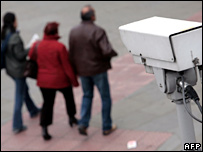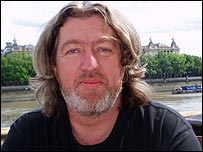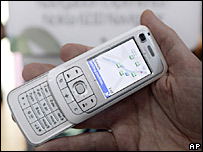Watching art imitate life
Bill Thompson wonders whether artists can respond to the growing surveillance of our everyday lives.

Surveillance systems are getting more sophisticated
|
![]() Next week I’m chairing a session at a major conference on digital arts in Cambridge, and if all goes well I’ll be making some of the people there feel pretty uncomfortable about their attitude to personal privacy.
Next week I’m chairing a session at a major conference on digital arts in Cambridge, and if all goes well I’ll be making some of the people there feel pretty uncomfortable about their attitude to personal privacy.
My session at the ENTER_ conference glories in the name ‘control technology’, and it’s about the ways in which artists make use of the many surveillance tools that surround and record us.
These range from films like Faceless, which use CCTV camera footage, to more radical projects like Julia Scher’s Predictive Engineering and (re)collector, a new project from UK artist James Coupe, all of which highlight the degree to which we are constantly monitored.
One of the reasons for discussing this now is that the development of surveillance systems seems to be accelerating, and the technology is getting more sophisticated.
We’re used to reports that the UK is the most-watched country in the world, but we may well look back on the days of simple closed-circuit television with some nostalgia.
Data protection
This week we’ve heard reports of ‘intelligent CCTV’ systems like ‘the bug’, an array of eight cameras that scan an area and use movement tracking software to look for unusual behaviour, allowing an operator to zoom in on anyone suspicious.
London is planning to follow Middlesbrough in installing cameras with loudspeakers so that anyone thinking of behaving in an inappropriate manner can be hectored from the control room and told what to do, just as the telescreens ordered Winston Smith to do his exercises in Nineteen Eighty-Four.
 |
More and more mobile phones come with GPS built-in, a boon for the geographically-challenged but something that could seriously damage our ability to go about our daily lives unobserved.
And of course almost everything we do online is recorded somewhere and will be available for inspection by the police if current EU plans to retain details of all emails sent, websites visited and files downloaded go through into national law.
Yet, despite the scare stories about the potential abuse of this information, we seem remarkably sanguine about the situation.
Millions of people share personal data online, from friendships on Facebook to favourite bands on MySpace, and not forgetting the photos of our friends, family and feet that go up on Flickr and Photobucket.
I’m as bad as anyone here, handing over my shopping patterns to supermarket loyalty schemes; sending unencrypted emails and visiting websites without seeking to disguise my identity; using Google for my searches and wandering the streets, often walking randomly around in a way that is guaranteed to make me look shifty.
It would be nice to think that the legal framework of data protection and human rights would go some way to protect us here, but I fear that we are going to have to take more direct action rather than rely on the Information Commissioner.
Heightened senses
There are some excellent projects which can help online, like Tor, the onion router, which will hide your identity from websites you visit.

More and more technology observes our movements
|
IBM’s Zurich Research Laboratory is working on ‘idemix’, a system which would allow individuals to have more control over the dissemination of their personal data. And there’s the OpenID project, an open source attempt to do something similar.
Alex van Someren, one of the panellists at the conference, is a founder of ncipher, a Cambridge company that helps companies keep their data safe, and he will have a lot to say about what individuals can do.
In the real world it’s a lot more complicated, especially when the mere fact of wearing a hat or hood can be seen as evidence of anti-social intent, and we may need to rely on legal measures and codes of practice when it comes to CCTV.
The collected images, data, sounds and videos from all of this monitoring provide raw material for many artists to work with.
Most claim that they are doing so to demonstrate the evils of surveillance, and that their goal is to mobilise opposition to the erosion of privacy and unobserved space, but I’m not sure this is an entirely consistent position.
It seems to be rather too much like the chancellor, who seeks to deter smoking by taxing tobacco but relies on the revenue generated to support other spending programmes.
There is a danger that the art, like other aspects of control technology, will only serve to dull our senses and dampen our indignation, leading us to feel that the unobserved life is not really worth fighting for.
But we cannot afford to go gently into the infrared light of the cameras that watch our streets, and we cannot afford to relax our vigilance when it comes to online surveillance.
I hope that the digital artists who will be speaking next week will recognise that their work raises these serious issues, and perhaps go some way to overcoming my feeling that turning surveillance into art will actually make it easier for those who want to chip away at what little privacy remains. ![]()
Bill Thompson is an independent journalist and regular commentator on the BBC World Service programme Digital Planet.